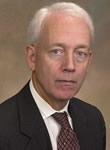Study to determine if exercise lowers heart failure death
GREENVILLE, N.C. (Mar. 26, 2004) — Physicians at the Cardiovascular Center of University Health Systems of East Carolina are studying whether a tailored exercise program can help people with heart failure live longer.
UHS, which includes Pitt County Memorial Hospital and is affiliated with the Brody School of Medicine at East Carolina University, is one of more than 50 sites in the United States and Canada participating in the $37 million trial. The study is sponsored by the National Heart, Lung and Blood Institute, part of the National Institutes of Health, and is coordinated by Duke University Medical Center cardiologists.

Dr. John Rose, an ECU cadiologist, is part of a $37 million study of the effect of exercise on people with congestive heart failure.
Numerous studies during the past decade have shown exercise can help reduce symptoms suffered by people with heart failure. This five-year, 3,000-patient randomized trial, however, will be the first large-scale prospective trial designed to determine whether exercise can reduce mortality and hospitalizations for patients with heart failure, researchers said.
“It sounds like a question that’s already been answered, but no one knows – it’s never been studied – if exercise is good for heart failure patients,” said Dr. John Rose, a cardiologist and professor of medicine at the Brody School of Medicine. Rose and Mari Stewart, a nurse practitioner with the Cardiovascular Center, are the investigators for the study locally.
Others helping lead the study are Jean Haas, an exercise physiologist; and Susan Ingram, manager of the heart failure program at the Cardiovascular Center. The study is called “HF-ACTION: Heart Failure and A Controlled Trial Investigating Outcomes of Exercise TraiNing.”
Rose said enrollment in the study has begun here and he expects 20 or so people to eventually participate in the study here.
Heart failure is a condition marked by the inability of heart muscles to pump enough oxygen and nutrients in the blood to body tissues. Also known as congestive heart failure, its many causes include infections of the heart, coronary artery disease, high blood pressure, previous heart attack and valve problems.
An estimated 4.8 million Americans suffer from heart failure, with 550,000 new cases reported each year. According to researchers, it is the only cardiovascular disease rising in incidence. Once diagnosed with heart failure, approximately 50 percent of patients die within five years.
Heart failure often leaves patients exhausted and breathless and can restrict their normal activities. No cure exists, but a number of medications can increase the strength of the heartbeat, relax blood vessels and remove excess fluid that accumulates in the lungs and elsewhere.
While earlier heart failure studies were very selective in the types of patients who were enrolled, this new study is open to a large segment of the heart failure population. Most patients with a weak heart will be candidates for the study. Their exercise regimen will be tailored to each patient’s particular condition and ability.
After medical histories and examinations, participants will be assigned randomly to either an intensive exercise program or to routine care. For the first three months, participants in the exercise group will work out on treadmills and stationary bikes three times weekly at the HealthSteps Cardiovascular and Pulmonary Rehabilitation Center, part of the Cardiovascular Center. After three months, they will continue their exercise regimen at home for up to three years. The trial will supply participants’ exercise equipment.
While mortality and hospitalization rates are the primary measures in the study, researchers also hope to learn more about medical complications exercise causes. Researchers also will be able to determine the types of patients who would benefit most from exercise and identify those for whom exercise might be too risky.